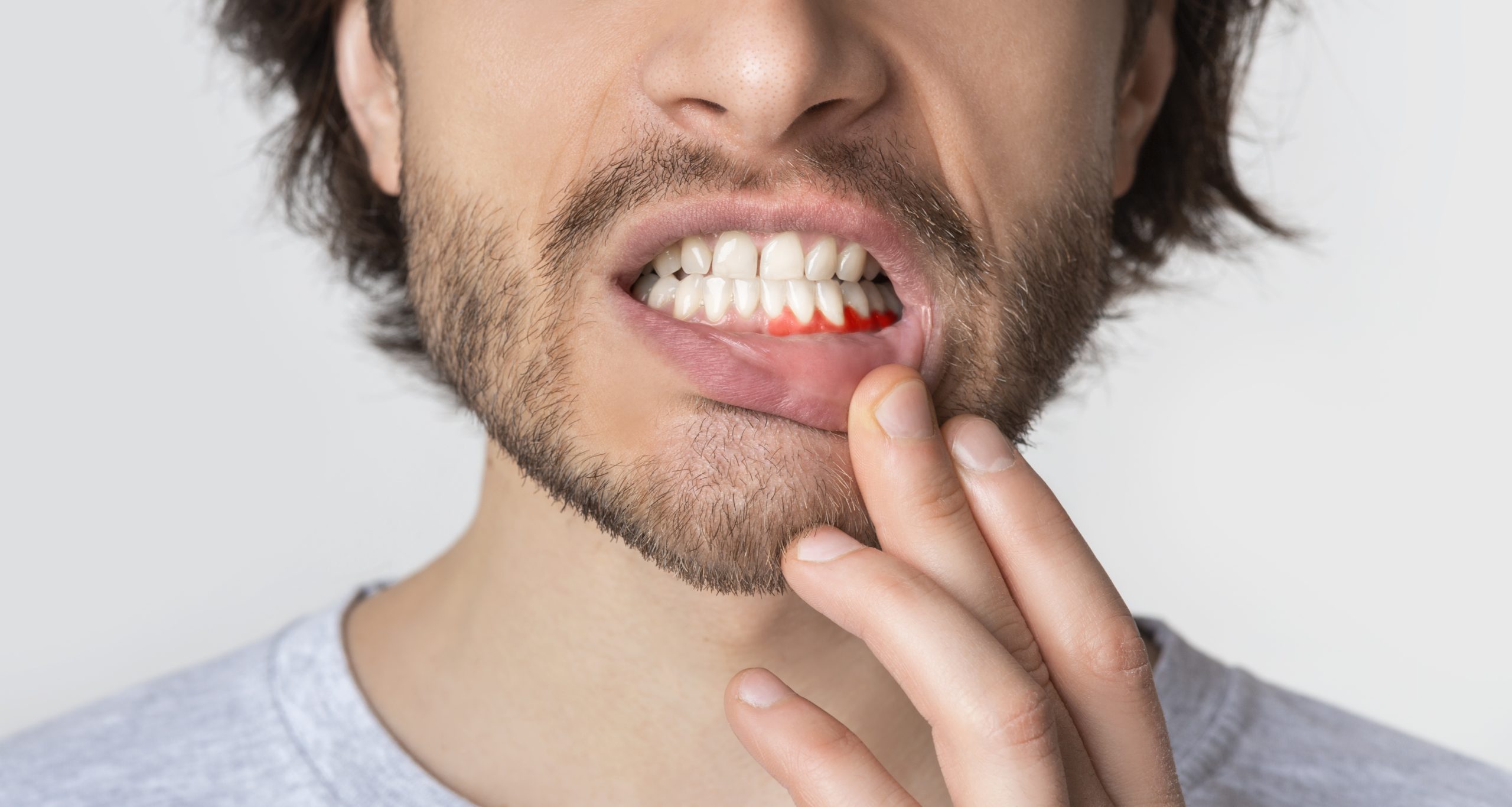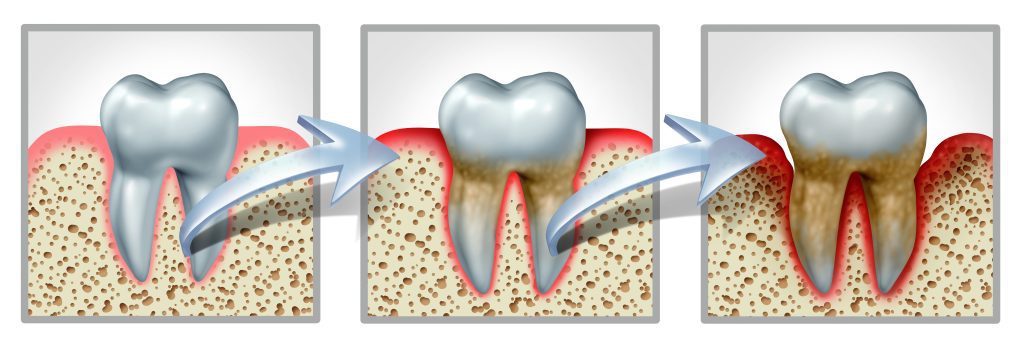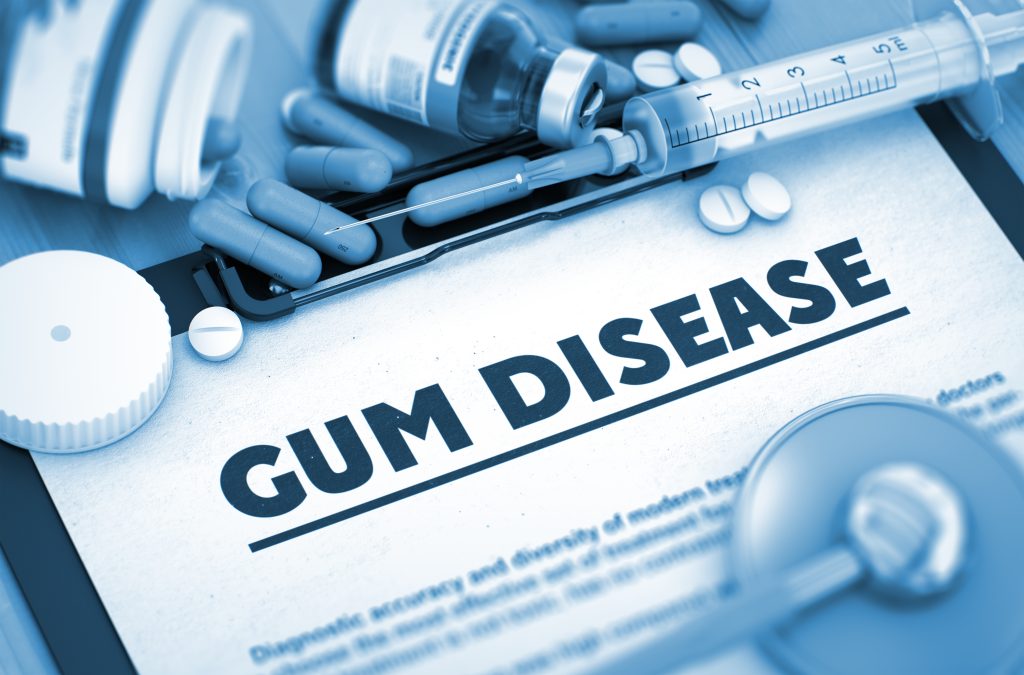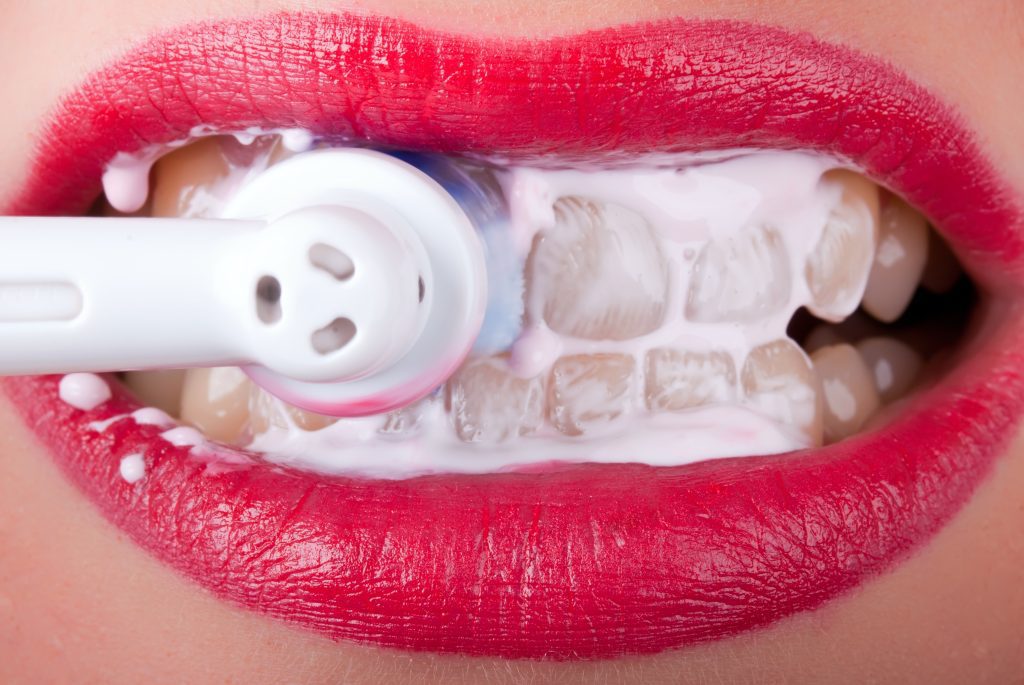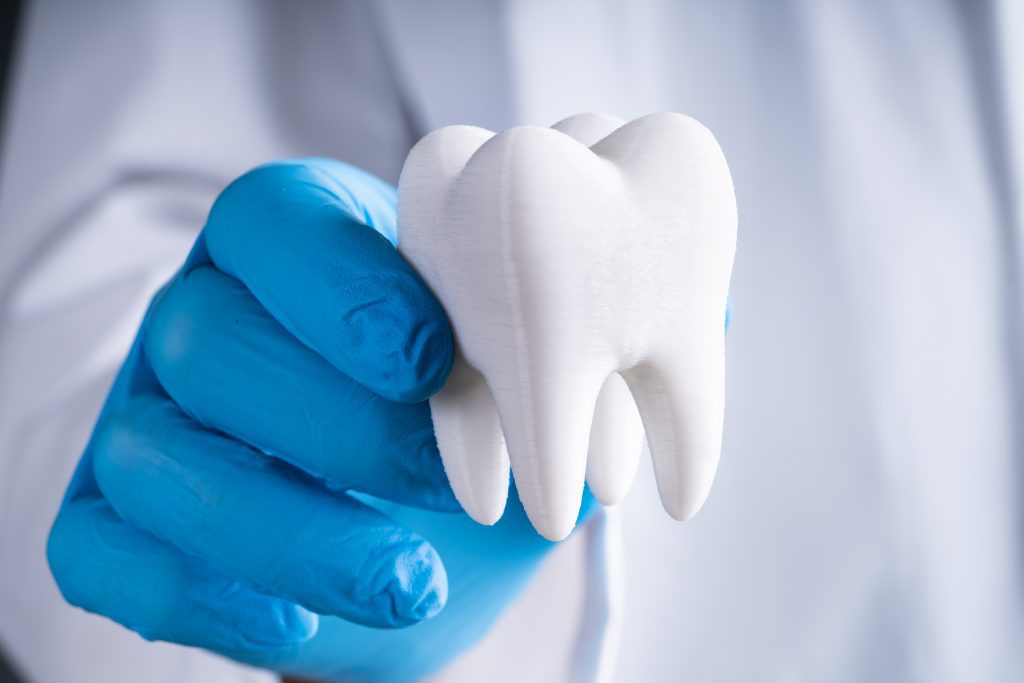If you’ve ever had bleeding gums, you know it’s not a fun experience. It can be scary if you don’t know what’s happening.
Bleeding gums can be a sign of gum disease. Left untreated, it can lead to more severe forms of periodontitis. So what do you do if your gums start bleeding?
If your gums are bleeding, the first thing you should do is see your dentist. They will be able to determine if the bleeding is due to gum disease or something else. If you did develop gum disease, they would start a treatment plan to help you regain your oral health.
However, gum disease is not the only reason your gums may bleed. In this article, we’ll talk about gum bleeding causes and what you can do to treat your bleeding gums.
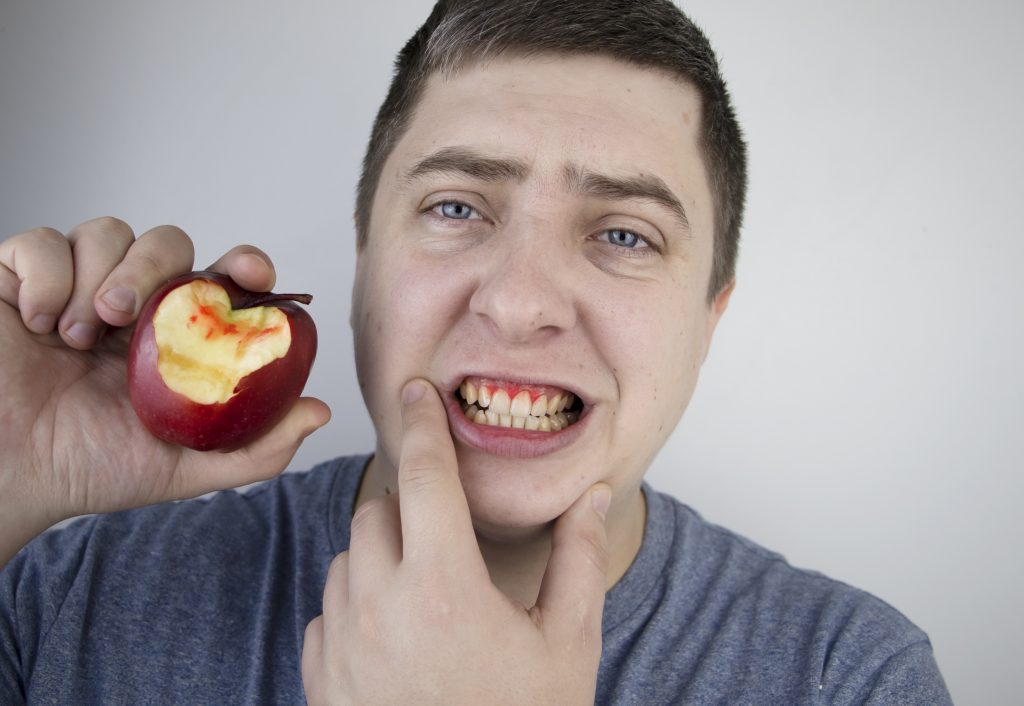
What Are the Causes of Bleeding Gums?
There are a few different things that can cause gums to bleed. Causes include:
Gum Disease
This disease is a gum infection that can cause bleeding. It’s essential to see your dentist if you think you may have gum disease so they can develop a treatment plan. Not only can your dentist prevent gum bleeding, but they can also help you keep your oral health in top condition.
Gingivitis
A mild form of gum disease, gingivitis is characterized by inflammation of the gums. In addition, gingivitis is caused by plaque buildup on the teeth.
Plaque is a sticky film of bacteria that forms on the teeth. If plaque bacteria is not removed, it can harden and turn into tartar. Tartar is a hard substance that can only be removed by professional cleaning.
If you have gingivitis, it can make your gums bleed and lead to more serious medical conditions like dental caries, halitosis, and periodontal disease. To prevent gingivitis, see your dentist regularly and make sure that you are practicing good oral hygiene.
Periodontal Disease
This more advanced form of gum disease can destroy the gums and the bone supporting the teeth. Periodontal disease is caused by plaque and tartar buildup. If you have periodontal disease, your gums will bleed, and you may experience tooth loss. Be sure to look for the early signs of periodontal disease and see your dentist if you think you may have it.
Brushing Too Hard
One of the top causes of bleeding gums is brushing incorrectly. If you brush your teeth too hard, you can irritate your gums and cause them to bleed. To reduce gum bleeding caused by brushing too hard, use a soft-bristle toothbrush and gentle strokes when brushing your teeth.
Flossing Too Roughly
Like brushing, if you floss too roughly you can irritate your gums and cause them to bleed. Flossing is vital to prevent gum infections. Be sure to use a gentle touch during your flossing routine to prevent bleeding gums.
Pregnancy
Some pregnant women experience bleeding gums due to the hormonal changes in their bodies, causing increased levels of some hormones. This is usually nothing to worry about and will go away after pregnancy.
You may hear this referred to as “pregnancy gingivitis.”
Menstruation
For some women, the hormones released during menstruation can cause their gums to bleed. However, like pregnancy gingivitis, this is likely nothing to worry about and will go away when hormone levels return to normal.
Certain Medications
Some medications, such as blood thinners, can cause gum bleeding as a side effect. If you are taking blood-thinning medications and experiencing gum bleeding, talk to your dentist or doctor to see if the medicine is the cause. They may be able to prescribe a different medication that doesn’t have this side effect or suggest other ways to stop bleeding gums.
Bleeding Disorders
If you have a bleeding disorder, you may find that your gums bleed more easily. Suppose your bleeding gums are caused by health conditions that affect your oral hygiene. In that case, it’s essential to see your doctor so they can treat it accordingly and your dentist to ensure that your teeth are not affected.
Oral or Other Cancer
Leukemia is a blood cancer that can cause your gums to bleed.
In rare cases, bleeding gums can be a sign of oral cancer. If you have bleeding gums and are experiencing other symptoms like a sore throat, pain when swallowing, or a lump in your neck, see your doctor immediately.
Ill-Fitting Dentures
If you wear dentures, you may find that ill-fitting dentures can cause your gums to bleed. Be sure to see your dentist if your dentures are causing your gums to bleed so they can adjust them accordingly.
Inadequate Plaque Removal
If you don’t remove all the plaque from your teeth, it can harden and turn into tartar. Tartar can irritate your gums, causing them to bleed and lead to gingivitis or periodontitis. So be sure to brush and floss daily to remove all the plaque from your teeth.
Scurvy
Scurvy is a disease caused by not getting enough vitamin C. Symptoms of scurvy include bleeding gums. A lack of Vitamin C is caused by not eating enough fruits and vegetables. So be sure to eat a healthy diet to avoid scurvy and maintain Vitamin C levels.
Vitamin Deficiencies
Like Vitamin C deficiencies, a lack of Vitamin K can cause your gums to bleed. A shortage of Vitamin K can be caused by a diet lacking leafy green vegetables. Be sure to eat a balanced diet to avoid any Vitamin K deficiencies.
If you have bleeding gums and think gingivitis or periodontitis is the problem, it’s important to see your dentist or doctor so they can determine the cause and provide appropriate treatment.
In most cases, bleeding gums are nothing to worry about and can be easily remedied. However, bleeding gums can signify a more serious condition in rare cases. If you are concerned about your gums bleeding, be sure to see a professional so they can give you the peace of mind you need.
How Can You Tell if Your Gums Are Healthy or Not?
While occasional bleeding is normal, there are a few indicators of unhealthy gums. If you have any of the following symptoms, you should see your dentist to determine the cause of bleeding gums and rule out any underlying health conditions.
- Gums that bleed easily
- Swollen gums that are red or tender
- Receding gums that are pulling away from your teeth
- Pus between your teeth and gums
- Persistent bad breath
- A change in the fit of your dentures
How Can You Treat Bleeding Gums?
First, don’t panic. Bleeding gums are not necessarily a sign of something serious and can often be easily treated. If you’re concerned, however, it’s always best to see a dentist or oral hygienist to get checked out. They will be able to determine the cause of the bleeding and develop a treatment plan to clear up the problem and prevent bleeding gums in the future.
In the meantime, you can try the following home remedies from the American Dental Association to help stop bleeding gums, prevent gum disease, and help you on your way to better gum health:
- Salt water or hydrogen peroxide rinses
- Gently brush your teeth
- Use a soft toothbrush
- Be sure to floss daily
- Use an antibacterial mouthwash
- Avoid tobacco products
- Limit sugary and acidic foods and drinks
- Eat a healthy diet
- Drink plenty of water
If home remedies don’t seem to be helping or your gums are still bleeding, make an appointment to see your dentist. They will be able to determine the cause of the bleeding and develop a treatment plan to clear up the problem and prevent bleeding gums in the future. This plan may include deep cleaning, antibiotics, or surgery.
What Are the Symptoms of Gum Disease?
The symptoms can range from mild to severe. Often, gum inflammation (gingivitis) is the first stage of oral disease. Symptoms of gingivitis include:
- Gums that bleed easily
- Inflamed gums that are red, swollen, or tender
- Gums that are pulling away from your teeth
- Persistent bad breath
If gum disease is left untreated, it can progress to periodontitis, a more serious form of gum disease that can lead to the loss of teeth. Symptoms of periodontitis include the previous symptoms, but also add:
- Pus between your teeth and gums
- Loose teeth
- Sensitive teeth
If you have any of these symptoms, you should see your dentist for an oral health checkup. If you have any oral health problems, they will develop an oral hygiene treatment plan to help get your gums healthy again.
What Are the Complications of Gum Disease?
If gum disease is left untreated, it can lead to several serious complications, including:
- Periodontal disease
- Tooth loss
- Bone loss
- Infection
- Abscesses
- The recession of the gum line
- Tooth decay
If you have gum disease, it is essential to see your dentist so they can develop a treatment plan focusing on your gum health to help avoid these complications.
How Is Gum Disease Treated
After being medically reviewed, your dentist will develop a treatment plan to help get your gums healthy again. This may include deep cleaning, antibiotics, or surgery.
Deep Cleaning
Deep cleaning is the process of removing plaque and tartar from below the gum line. This can be done by scaling and root planing. Scaling involves using a special toothbrush or ultrasonic device to remove plaque and tartar from the teeth. Root planing is a process of smoothing out the roots of the teeth to help prevent plaque and tartar from building up again.
Antibiotics
In some cases, your dentist may prescribe antibiotics to help treat gum disease. Antibiotics can help kill the bacteria that cause gum disease.
Surgery
In severe cases of gum disease, surgery may be necessary to treat the problem. A few different types of surgical procedures can be used to treat gum disease. These include:
- Pocket reduction surgery – This procedure involves making small cuts in the gum tissue to reduce bacteria by removing the pockets of bacteria that have formed.
- Gum graft surgery – This procedure involves taking gum tissue from another area of the mouth and grafting it onto the affected areas.
- Bone graft surgery – This procedure involves taking bone from another area of the body and grafting it onto the affected areas.
- Dental implants – This procedure involves placing metal rods into the jawbone to support artificial teeth.
Can Gum Disease Be Prevented?
Yes, gum disease can be prevented! The best way to avoid this disease is to practice good oral hygiene. This includes brushing your teeth twice daily, flossing daily, and seeing your dentist for regular oral health checkups and cleanings.
You can also help prevent gum and periodontal disease if you quit smoking and eat a healthy diet. If you have a medical condition such as diabetes or heart disease that affects your overall health, you should manage it properly.
The Bottom Line
If you have bleeding gums, don’t ignore this early warning sign! It’s important to see your dentist in the early stages so they can determine the major cause of your bleeding and develop a treatment plan. (It could be as small of an issue as using the wrong technique while brushing or flossing!)
In the meantime, you can also try home remedies to help treat your bleeding gums. Practice good oral hygiene and quit tobacco products to help prevent disease. If you have any concerns, please reach out to your dentist.
If you are looking for a new dentist in the Metro-Detroit area, Patient Empowered Dentistry is currently accepting new patients! Visit our website or contact us at (586) 771-6340 to learn more.


